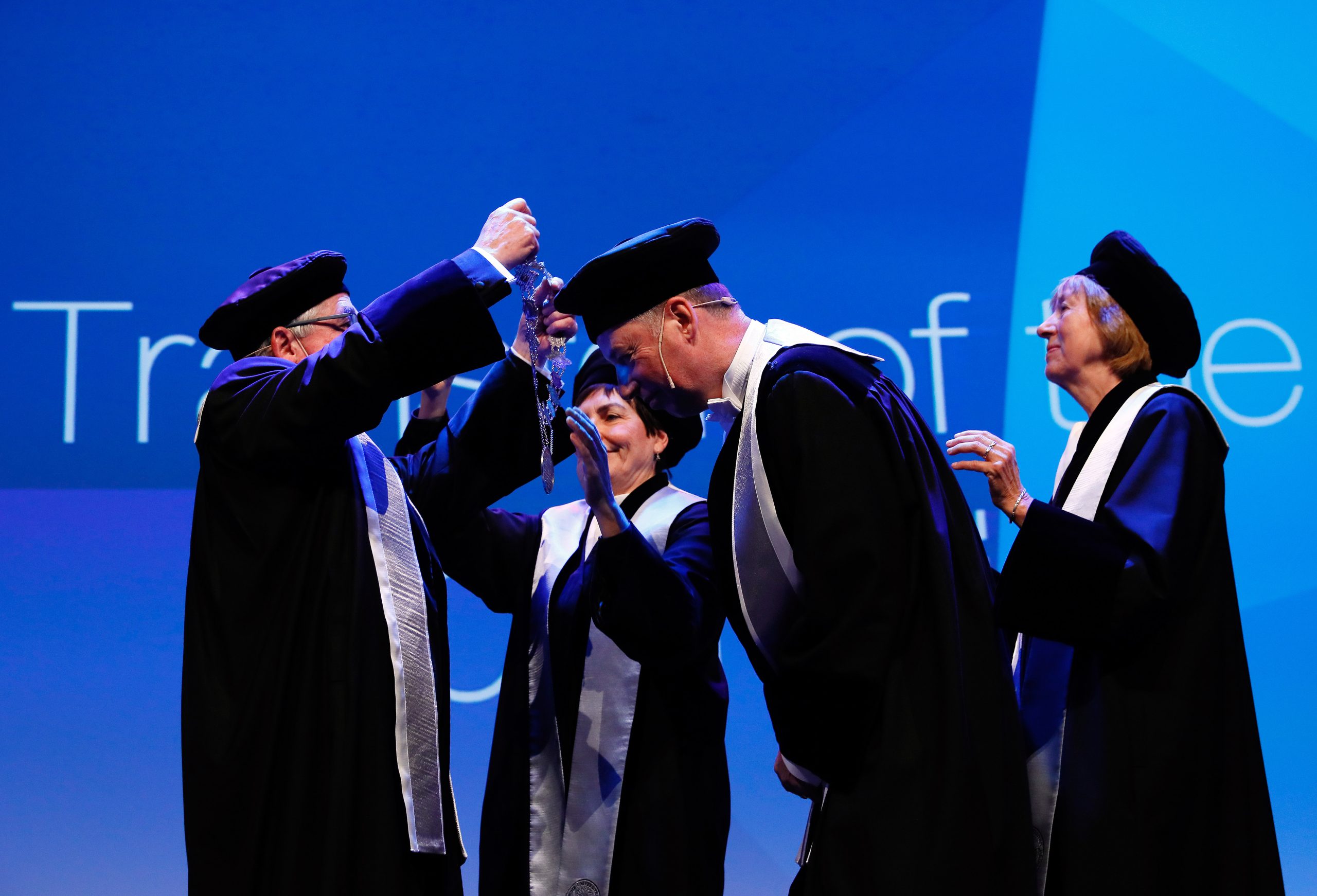A complete change in the highest rank at TU Delft: both administrators will leave next year. Their spokesperson says that this is not related to the many calls for their departure, but for strategic reasons.
(Photo: Thijs van Reeuwijk)
Rob Mudde’s departure seems like an omen: his two co-administrators will soon leave too. This was announced in an internal notice by the Executive Board and the Supervisory Board on Wednesday. Executive Board Chair and Rector Magnificus Tim van der Hagen will hand over the reins to his successor at the Dies Natalis in January 2026. There will be no second term for Marien van der Meer (Vice President Operations). She will step down in August.
This is an unexpected turn of events after it was decided last year that Van der Hagen would serve a third term until his retirement in October 2026. He himself opted for an early departure, said a spokesperson, and in doing so makes it possible for the new governance model to be introduced at the beginning of 2026. However, he will remain associated with TU Delft in an as yet unknown role until he reaches his pensionable age.
The reappointment process of Marien van der Meer, who has been in office since August 2021, was started in autumn. The Supervisory Board decided not to extend her term of office. The spokesperson said that this decision ‘was also taken in accordance with plans for the future’ (referring to the decisions about the governance model, Eds.). The search for her successor will start shortly. Whether the position will remain the same is as yet unknown.
No dual role
Tim van der Hagen’s successor will explicitly only be the Executive Board Chair and not Rector Magnificus as well, the notice says. Unlike Van der Hagen, the new Chair will not have a dual role. This means that TU Delft will return to the governance model of before 2018.
Up to that point, the roles of Rector Magnificus and Executive Board Chair were assigned to different people. This is the most common practice at Dutch universities. At the moment, only the University of Tilburg and TU Delft have a combined position. The University of Leiden ended it after 16 years in 2021.

The dual position at TU Delft was created in 2018. Van der Hagen started as the Executive Board Chair in 2016 and two years later was appointed Rector Magnificus as well. Mudde took on the Vice Chair dual role as soon as he was appointed in that year. Van der Hagen is responsible for academic research at TU Delft, while Mudde was responsible for education. In his farewell interview, Mudde praised the TU Delft model that he believes ensures that education is not overshadowed by research.
Other divisions
The new model divides the tasks differently. The Executive Board Chair concentrates on organisational issues and looks outwards. The Rector Magnificus concentrates on internal matters and is responsible for both research and education. In its new form, the Executive Board will also consist of three members.
The search for a new Rector Magnificus has already started. Or to be more specific, the intention is that Mudde’s successor will still have the Vice Chair dual role until January 2026, and will then become the Rector Magnificus. The new Vice Chair and Rector will be announced later. Until then, Hans Hellendoorn will take on the position of Vice Rector/Chair.
The adapted role division came about from the evaluation of the management model by the Supervisory Board in September after Mudde’s departure. The Supervisory Board talked to directors, deans and the Rector Magnificus himself. A similar evaluation had been carried out five years previously. At the time, Delta was not given access to the report despite repeated requests.
Enough time and attention
The discussions showed a ‘slight preference’ for the ‘separate model’, says the Supervisory Board in the notice that it made public on Wednesday. The Board concluded that it ‘is desirable for the future that the role of Chair is given to a Board member who […] can devote enough time and attention’ to ‘societal developments, changing geopolitical relationships and a strongly changing political climate’.
Internal developments are requiring more and more attention in recent years
Internal developments are also requiring more and more attention in recent years, says the Board. A spokesperson added that this also includes social safety issues which calls for a ‘Rector Magnificus with a strong internal focus’. The Board also states that the education and research portfolios, once independent of each other, are now so strongly linked that it would be better to bring them together in one position. On top of this, the Supervisory Board also believes that candidates for dual positions are scarce.
The departure of the Board members is a long cherished wish of many staff members and students since the Inspectorate of Education issued its damning report about the lack of social safety at TU Delft in March. The Inspectorate expressed strong criticism of the role of the Executive Board in the report. Despite the accusations, stated in a draft report and known to the Executive Board and Supervisory Board, Van der Hagen was reappointed for a third term in February.
Calls for departure
In June, it transpired that the Inspectorate of Education had ‘little confidence’ that the mismanagement at TU Delft could be set right by the Executive Board. Students and Staff for Society, the pressure group that was specially created, has been calling for their departure since the report was made public. In April, its members told Delta that it ‘fails to foresee any path for them to win [their trust] back after all that has happened’. In September, they requested the Inspectorate ‘to reconsider the positions of the current members of the Executive Board and Supervisory Board’.
The CNV Education union concludes that ‘the current Executive Board is [not] able to bring about a change in culture’ as the union’s Chair wrote in a letter to Minister of Education Bruins in October. That said, their spokesperson says that the lack of social safety is not the reason for Van der Hagen and Van der Meer stepping down. ‘Their decisions were not taken “under pressure”, but in consideration of major case files.’
The proposal for the new management model is still with the representation bodies and is expected to be finalised at the end of this month. Opposition is not expected as the Works Council and Student Council are in favour of the change.
With the support of Marjolein van der Veldt



Comments are closed.